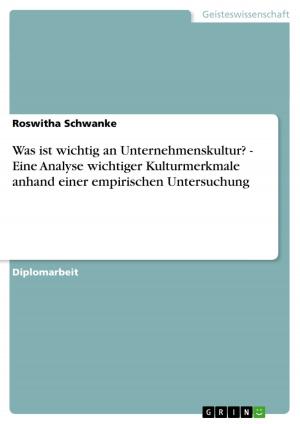| Author: | Heiko Bubholz | ISBN: | 9783638133883 |
| Publisher: | GRIN Publishing | Publication: | July 19, 2002 |
| Imprint: | GRIN Publishing | Language: | English |
| Author: | Heiko Bubholz |
| ISBN: | 9783638133883 |
| Publisher: | GRIN Publishing |
| Publication: | July 19, 2002 |
| Imprint: | GRIN Publishing |
| Language: | English |
Seminar paper from the year 2002 in the subject Economy - Theory of Competition, Competition Policy, grade: 1,3 (A), Jagiellonian University in Krakow (Centre for European Studies), course: EU Economy in Global Context, 19 entries in the bibliography, language: English, abstract: All European Treaties express an attitude towards integration, which first time had been formulated and later on realised with the Schuman Plan. From that point on, the economic integration evolved to its today's magnitude in form of a Common Market and the historical move towards the implementation of ?-currency in these days. The advantages of a Common Market had ever been understood regarding the potentially continuing and sustaining growth, guaranteeing a relatively high standard of living in wide area of the Member States of the European Union. Further, the existence of the integrated market may lead to a more or less homogenous and harmonic development of the relations of the Member States and the union's periphery. The notion that unfair or restraining acts and behaviour will not go along with the liberal minded treaties, and will therefor be prohibited, may be found already in the Treaty of the European Coal and Steal Community (ECSC) from 1952. According to the Single European Act of 1986, an internal market shall be established, characterised by the free movement of goods and services, persons and capital. Article 10 of the TEU requests the Member States 'to ensure fulfilment of the obligations arising out of this Treaty or resulting from action taken by the institutions of the Community'. Correspondingly, the Member States 'shall abstain from any measure which could jeopardise the attainment of the objectives of this Treaty'. From these less restrictive formulations result some obligations for the Member States in order to assure a free market and liberal competition1. In contrast to some other but less 'communised' field of European policies this is drawn to that extent that national competition regulation are supposed to be adapted, or even abolished, to ensure the jurisdictional unity and equality of competition throughout the European Union (EU) 2. The foundation of European competition law results from Article 81 TEC (restriction of competition) and Article 82 TEC (abuse of dominating position). Article 83 to 89 TEC concern additional regulations, which might not be covered with this paper. According to EMMERICH and despite some more or less spectacular decisions made by the respective competition authorities one can hardly assert that a unique and workable European competition policy is in existence now3. [...] _____ 1 Schmidt/Schmidt (1997), p. 3. 2 Zuleeg (1997), p. 129. 3 Emmerich (1994), p. 512.
Seminar paper from the year 2002 in the subject Economy - Theory of Competition, Competition Policy, grade: 1,3 (A), Jagiellonian University in Krakow (Centre for European Studies), course: EU Economy in Global Context, 19 entries in the bibliography, language: English, abstract: All European Treaties express an attitude towards integration, which first time had been formulated and later on realised with the Schuman Plan. From that point on, the economic integration evolved to its today's magnitude in form of a Common Market and the historical move towards the implementation of ?-currency in these days. The advantages of a Common Market had ever been understood regarding the potentially continuing and sustaining growth, guaranteeing a relatively high standard of living in wide area of the Member States of the European Union. Further, the existence of the integrated market may lead to a more or less homogenous and harmonic development of the relations of the Member States and the union's periphery. The notion that unfair or restraining acts and behaviour will not go along with the liberal minded treaties, and will therefor be prohibited, may be found already in the Treaty of the European Coal and Steal Community (ECSC) from 1952. According to the Single European Act of 1986, an internal market shall be established, characterised by the free movement of goods and services, persons and capital. Article 10 of the TEU requests the Member States 'to ensure fulfilment of the obligations arising out of this Treaty or resulting from action taken by the institutions of the Community'. Correspondingly, the Member States 'shall abstain from any measure which could jeopardise the attainment of the objectives of this Treaty'. From these less restrictive formulations result some obligations for the Member States in order to assure a free market and liberal competition1. In contrast to some other but less 'communised' field of European policies this is drawn to that extent that national competition regulation are supposed to be adapted, or even abolished, to ensure the jurisdictional unity and equality of competition throughout the European Union (EU) 2. The foundation of European competition law results from Article 81 TEC (restriction of competition) and Article 82 TEC (abuse of dominating position). Article 83 to 89 TEC concern additional regulations, which might not be covered with this paper. According to EMMERICH and despite some more or less spectacular decisions made by the respective competition authorities one can hardly assert that a unique and workable European competition policy is in existence now3. [...] _____ 1 Schmidt/Schmidt (1997), p. 3. 2 Zuleeg (1997), p. 129. 3 Emmerich (1994), p. 512.















